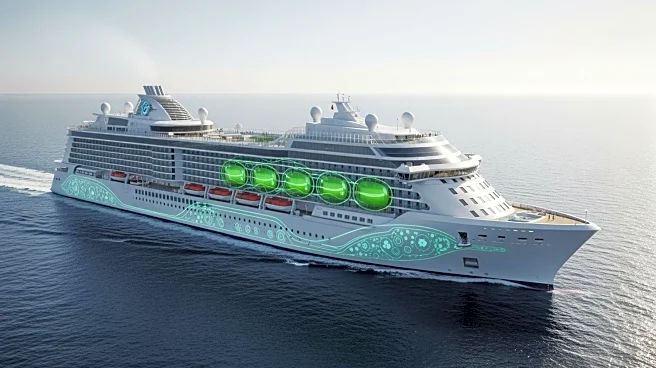What's Happening?
Ponant Explorations Group, in collaboration with GTT and Bloom Energy, has announced a groundbreaking project to develop the first net-zero cruise ship. The initiative, known as the Swap2Zero Project,
aims to achieve carbon neutrality through innovative energy solutions. The project involves the integration of fuel cells and marine carbon capture technology to meet the vessel's energy needs. The cruise ship, designed by LMG Marin and Stirling Design, will feature approximately 100 passenger cabins and utilize 50 percent wind energy, photovoltaic panels, and hydrogen fuel cells. The vessel is projected to reduce greenhouse gas emissions by over 80 percent and operate autonomously for up to 30 days. The project has received a €40 million grant from the EU to support its development, with the goal of having the ship in service by 2030.
Why It's Important?
This initiative represents a significant step forward in the maritime industry's efforts to decarbonize and reduce environmental impact. By integrating advanced technologies such as solid oxide fuel cells and carbon capture systems, the project aims to set a new standard for sustainable shipping. The successful implementation of this project could lead to widespread adoption of similar technologies across the industry, potentially reducing emissions and reliance on fossil fuels. Stakeholders in the maritime sector, including shipbuilders, operators, and environmental groups, stand to benefit from the project's success, as it could drive innovation and create new opportunities for sustainable practices.
What's Next?
Ponant Explorations Group plans to continue developing the Swap2Zero Project with the goal of launching the vessel by 2030. As the project progresses, it is likely to attract attention from other maritime companies and environmental organizations interested in sustainable shipping solutions. The collaboration between GTT, Bloom Energy, and Ponant may inspire further partnerships aimed at achieving carbon neutrality in the maritime sector. Additionally, the project's success could influence regulatory policies and encourage investment in green technologies, potentially leading to broader industry changes.
Beyond the Headlines
The Swap2Zero Project not only addresses environmental concerns but also highlights the potential for technological innovation in the maritime industry. The integration of fuel cells and carbon capture systems could pave the way for new energy solutions that extend beyond shipping, impacting other sectors such as transportation and energy production. Furthermore, the project's focus on sustainability may influence consumer preferences, as travelers increasingly seek eco-friendly options. This shift could drive demand for similar initiatives, encouraging companies to prioritize environmental responsibility.









